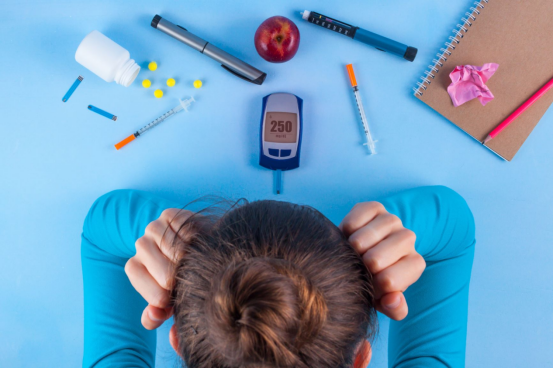
Diabetes, a chronic condition that affects how your body processes blood sugar (glucose), is one of the fastest-growing health concerns globally. Whether you have Type 1 or Type 2 diabetes, managing your blood sugar levels is crucial for avoiding complications and living a healthy, fulfilling life. While diabetes requires long-term management, the good news is that with the right strategies, it's possible to effectively lower blood sugar levels and prevent further health issues.

In this article, we’ll share proven tips and expert advice on how to lower blood sugar, manage diabetes effectively, and live your best life. From diet changes to lifestyle modifications, these tips can help you take control of your health.
1. Adopt a Balanced and Low-Glycemic Diet
One of the most powerful ways to control blood sugar is through your diet. Foods that are high in sugar and refined carbohydrates can cause spikes in blood sugar levels, while low-glycemic foods have a much more gradual effect. Here are some key dietary changes to make:
- Eat plenty of non-starchy vegetables: Leafy greens, broccoli, cauliflower, and peppers are excellent choices.
- Choose whole grains: Brown rice, quinoa, oats, and whole wheat are great alternatives to refined carbs like white bread and pasta.
- Include lean proteins: Skinless chicken, turkey, fish, tofu, and legumes are great protein sources that don't cause spikes in blood sugar.
- Limit sugary snacks: Avoid sugary beverages, candies, and baked goods, which can cause rapid blood sugar increases.
- Incorporate healthy fats: Avocados, nuts, seeds, and olive oil can help stabilize blood sugar levels.
Pro Tip: Aim to eat smaller meals throughout the day to keep your blood sugar levels steady.
2. Exercise Regularly
Physical activity is essential for managing diabetes and lowering blood sugar. Exercise helps your body use insulin more effectively, allowing for better blood sugar control. Here are some key recommendations:
- Aim for at least 150 minutes of moderate-intensity exercise per week, such as brisk walking, cycling, or swimming.
- Include strength training: Adding weightlifting or resistance exercises at least two days a week can improve insulin sensitivity and help with weight management.
- Try high-intensity interval training (HIIT): Short bursts of intense activity followed by rest periods can help improve insulin sensitivity and glucose control.
Pro Tip: Start slowly if you're new to exercise, and gradually increase the intensity. Consistency is key!
3. Monitor Your Blood Sugar Regularly
Regular blood sugar monitoring is crucial for managing diabetes. By keeping track of your blood sugar levels, you can understand how different foods, exercise, and lifestyle habits impact your blood sugar. This allows you to make more informed decisions about your health.
- Check your blood sugar levels multiple times a day, especially before and after meals, and adjust your diet or medication accordingly.
- Use a continuous glucose monitor (CGM): CGMs provide real-time data on your blood sugar levels, helping you track trends and better manage your condition.
Pro Tip: Keeping a log of your blood sugar readings, along with details about your meals and exercise, can help you identify patterns and make adjustments to your routine.
4. Stay Hydrated
Proper hydration is essential for maintaining healthy blood sugar levels. Dehydration can cause blood sugar levels to rise, so it's important to drink plenty of water throughout the day.
- Drink water: Aim for at least 8 cups (64 ounces) of water daily, and more if you exercise or live in a hot climate.
- Avoid sugary drinks: Soda, fruit juices, and sweetened coffee drinks can rapidly spike your blood sugar, so opt for water, herbal teas, or unsweetened beverages instead.
Pro Tip: Carry a water bottle with you throughout the day to remind yourself to stay hydrated.
5. Incorporate Stress-Reducing Practices
Chronic stress can negatively affect blood sugar levels by triggering the release of stress hormones like cortisol. By managing stress, you can help keep your blood sugar levels under control. Here are some stress-reduction strategies:
- Practice mindfulness or meditation: Techniques like deep breathing and guided meditation can help reduce stress and improve your overall well-being.
- Exercise regularly: Physical activity is a natural stress reliever that also helps lower blood sugar.
- Get enough sleep: Aim for 7-8 hours of quality sleep each night. Poor sleep can lead to higher blood sugar levels and worsen diabetes symptoms.
Pro Tip: Even taking short breaks during the day to breathe deeply or stretch can help lower stress and support better blood sugar control.
6. Medications and Insulin Therapy
For many people with diabetes, lifestyle changes alone may not be enough to keep blood sugar in check. In these cases, medications and insulin therapy are often necessary. Common medications include:
- Metformin: Helps lower blood sugar by improving the way your body handles insulin.
- Sulfonylureas: Stimulate the pancreas to release more insulin.
- Insulin therapy: Insulin injections or an insulin pump may be required for those with Type 1 diabetes or advanced Type 2 diabetes.
Pro Tip: It's important to follow your doctor’s instructions for taking medications and insulin to avoid fluctuations in blood sugar levels.
7. Lose Excess Weight
Losing weight, especially around your midsection, can significantly improve insulin sensitivity and help lower blood sugar levels. Even a modest weight loss of 5-10% of your body weight can lead to significant improvements in blood sugar control.
- Follow a healthy, balanced diet: Focus on whole foods, fiber-rich meals, and portion control.
- Increase physical activity: Regular exercise is key to weight loss and blood sugar management.
- Set realistic goals: Aim for gradual, sustainable weight loss rather than extreme dieting.
Pro Tip: Weight loss doesn’t happen overnight, so be patient with yourself and celebrate small victories along the way.
8. Know Your Numbers
It's essential to regularly check your A1C levels, a blood test that provides a 3-month average of your blood sugar levels. Maintaining an A1C level below 7% is typically recommended for people with diabetes.
- Track your A1C levels: Work with your doctor to set a target A1C level and monitor your progress.
- Stay proactive: Regular check-ups with your healthcare provider can help you stay on top of your diabetes management and adjust your treatment plan if needed.
Pro Tip: Discuss your goals with your doctor, and ask for advice on how to achieve better blood sugar control.
Conclusion: Take Control of Your Diabetes Today
Managing diabetes and lowering blood sugar requires a comprehensive approach that includes a healthy diet, regular exercise, stress management, medication when necessary, and consistent monitoring. By adopting these strategies, you can improve your blood sugar control, reduce the risk of complications, and live a healthier, more vibrant life.
If you’re ready to take charge of your diabetes, start by making small, manageable changes to your lifestyle today. Consult your healthcare provider to create a personalized plan that works for you, and remember, you don’t have to do it alone — support is available every step of the way.
Ready to Lower Your Blood Sugar? Take Action Today!
Implementing these simple, expert-backed strategies will help you take control of your diabetes and improve your overall health. If you're looking for more tips or need additional support, consult your doctor or a diabetes educator. Your journey to better health starts now!







